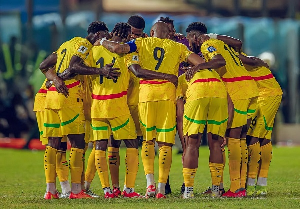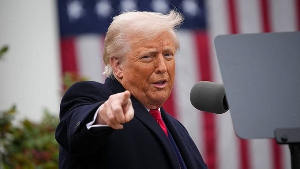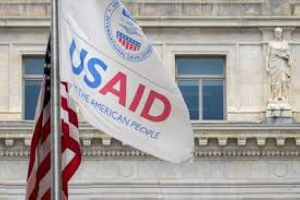I had run into Mr. Joe Appiah in Col. Acheampong’s house shortly after the Colonel had seized power from the Busia regime.
Joe Appiah greeted me heartily.
To my surprise, he said, unprompted, “Cameron, it is ‘BACK TO BATAAN!’ right?” This was a politically coded message, and I understood it. He was kindly suggesting that I should go and take back my post as Editor of the Daily Graphic!
You see, ‘BACK TO BATAAN’ was an expression that I had popularised by using the term as a banner headline on the front page of the Graphic to celebrate a famous victory the paper had chalked up regarding a scandalous and very unusual transaction between a British businessman and the Ghana Government.
The businessman, one Victor Passer, had “somehow” obtained intelligence that the Busia Government "did not like" state ownership of the means of production and might sell off many of Ghana's state enterprises if approached. Those who bought Communist-made things from Ghana might also, on the side, gain knowledge of Communist methods of manufacturing.
Passer, no doubt with secret British diplomatic assistance, convinced the Busia Government to sell to him, at rock-bottom prices, a fleet of fishing trawlers
that Ghana, under the Nkrumah regime, had bought from the Soviet Union.
The British businessman had, in turn, "sold" the trawlers to Brazil!
It doesn't make any sense to me. Although Ghanaians needed cheap fish as much as the Brazilians did, we should be selling our fishing trawlers to help Brazil obtain cheap fish while we paid high prices for the fish we consumed. If the trawlers were no good, why were they needed in Brazil?
I ignored the politics and concentrated on practical realities. Was it a corrupt deal between the then Minister of Agriculture, Dr Kwame Asafo Adu,
and the British businessman?
Had a "commission"—in valuable foreign exchange—changed hands? They wanted the public to believe that because the trawlers were Soviet-made, they were inferior in quality. But wasn’t that stupid propaganda? The Soviet Union could send astronauts into space but wasn’t capable of constructing efficient fishing trawlers.
In the midst of the argument, the businessman tried to steal the boats away secretly! But I got tipped off about this and exposed the secret maneuver on the front page of the Graphic!
A libel action was immediately instituted against the Graphic, claiming that by saying the boats had "stolen away," we had maligned the British businessman.
I went to see the brilliant lawyer of the Graphic, Mr. J. K. Agyemang, and convinced him that our facts could "justify" every word we had written about the issue. And "justification" was a complete defence in libel cases.
Our defence would expose all aspects of the deal, including the motivation for the sale.
But Prime Minister Busia wasn’t having any of that. He ordered the Ghana Navy to bring the boats back from the high seas.
It was a marvellous victory for the Graphic, and I went, in a Ghana Navy dinghy boat, to "welcome" the boats back to Ghana! No, I wasn't the least bit ashamed of being "histrionic"! A good laugh was to be had by all, for newspapers also had an entertainment function.
So on the day after the boats arrived back, there was this front-page banner
headline: “BACK TO BATAAN!”
Joe Appiah, who was from the generation that had enjoyed the popular American World War Two film “BACK TO BATAAN”, had appreciated the Graphic headline and hailed me in Acheampong’s house with the words: “Cameron, it’s ‘Back to
Bataan’, innit?"
This was, despite the joke, a coded message to me, inviting me to go back and resume my editorship of the Daily Graphic. He implied that he would on the
Acheampong regime to achieve that objective.
However, I shook my head at Joe. My editorship of the Graphic had given me an emotional rollercoaster ride, and I wouldn't enjoy a second stint at the job.
And now, over 20 years later, here I am being given a hint that I should read Joe Apiah’s autobiography and learn from it, something that would be of
the greatest interest to me.
I suspected it would be about the acrimonious debate between me and Prime Minister Busia on “Dialogue with South Africa that had caused my dismissal from the Graphic in 1970. But what form would the disclosure take?
I anxiously got hold of “JOE APPIAH, THE AUTOBIOGRAPHY OF AN AFRICAN PATRIOT.”. It’s a very readable book, especially as it reveals aspects of Joe Appiah’s days in London, where he was Dr. Kwame Nkrumah’s "personal representative" in the UK for a time.
There, he also became a comrade of George Padmore, perhaps the greatest campaigner for African independence that ever lived.
But what had Joe Appiah written in his autobiography that I was being urged to read?
I did eventually get hold of “THE AUTOBIOGRAPHY OF AN AFRICAN PATRIOT," which was published by Praeger (New York & London, ISBN-10 027464424X; ISBN-13-9780275936723).]
The relevant, all-telling quotation is on pages 335–6 of the edition I got. It
reads:
QUOTE [regarding Prof. K A Busia] “I was sorry when, on a matter of principle, I was obliged to sever our political relationship of many years. He was a gentleman and a Christian and it was because he bore these trademarks that I found it difficult to understand why he did some of the evil things that he
did or allowed his government to do.
“All these I have forgiven except one! It is the shocking revelation that "Prof," an African politician and fighter for freedom in Ghana for years, was in direct touch with the murderer of Africans in South Africa and presiding arch-priest of the doomed temple of apartheid, Balthazar Johannes Vorster!
“One letter, dated April 2, 1971, marked “Secret and Confidential” to Dr Busia
from ‘Kantoor van die Erste Minister (Prime Minister’s Office) Cape Town” and signed by Vorster is proof of this.
“The letter thanks Busia for his "aid.”. On this letter hangs the tale of Prof.
stubborn insistence on ‘dialogue’ with the cursed apartheid regime of South Africa. This letter was left in his office after his successor, Acheampong, took over, and it was he who gave me a copy.
In several editorials in the Graphic in 1970, I had warned Busia that the apartheid regime was wooing African leaders—some “with Pretoria cash"—to
abandon their brothers in South Africa to apartheid and the slave labour it reserved for the blacks of the country.
I had quoted a report in one of the most authoritative papers on monetary affairs in the world, "The [London] Financial Times, to make my case.
Instead of taking the warning seriously, Dr. Busia sacked me!
Joe Appiah’s revelation shows that Dr. Busia and the likes of Houphiouet-Boigny of the Ivory Coast, who also supported the "dialogue" political ploy of apartheid South Africa, Maneuver, knew exactly what they were doing.
We have the word of Mr. Vorster himself: what “aid” had Dr. Busia given Vorster that had made Vorster write a ‘Secret and Confidential’ letter to “thank’’ him without specifying exactly what he was asking `Busia for?
(To learn more about South Africa’s attempt to bribe black African countries with his “dialogue” ploy, Google ‘MULDERGATE+APARTHEID’.
You will get the whole shocking story of betrayal and mendacity among some African "leaders"!
Opinions of Wednesday, 29 May 2024
Columnist: Cameron Duodu



![Prof Adei [L], Ayikoi Otoo, Baffour Awuah and Janet Nabla Prof Adei [L], Ayikoi Otoo, Baffour Awuah and Janet Nabla](https://cdn.ghanaweb.com/imagelib/pics/483/48355074.295.jpg)











